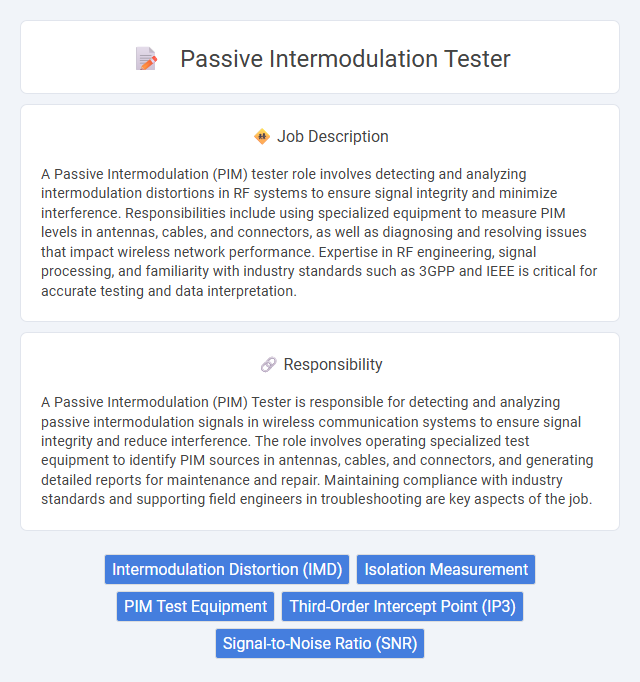
A Passive Intermodulation (PIM) tester role involves detecting and analyzing intermodulation distortions in RF systems to ensure signal integrity and minimize interference. Responsibilities include using specialized equipment to measure PIM levels in antennas, cables, and connectors, as well as diagnosing and resolving issues that impact wireless network performance. Expertise in RF engineering, signal processing, and familiarity with industry standards such as 3GPP and IEEE is critical for accurate testing and data interpretation.
Individuals with strong analytical skills and attention to detail are likely suitable for a passive intermodulation tester role, as the job involves precise measurement and identification of signal interference. Those who work well independently and are comfortable with technical equipment and data interpretation probably find this position fitting. Candidates with a background in electronics or telecommunications might have a higher probability of success in this role compared to those without relevant technical experience.
Qualification
A Passive Intermodulation (PIM) Tester job requires strong technical expertise in RF systems, signal analysis, and test equipment operation to accurately detect and measure intermodulation distortion in communication networks. Candidates typically need a background in electrical engineering or telecommunications, along with experience in using spectrum analyzers, vector network analyzers, and PIM test sets. Proficiency in interpreting test results, troubleshooting passive components, and knowledge of industry standards such as IEC 62037 or 3GPP specifications is essential for ensuring high-quality passive intermodulation testing.
Responsibility
A Passive Intermodulation (PIM) Tester is responsible for detecting and analyzing passive intermodulation signals in wireless communication systems to ensure signal integrity and reduce interference. The role involves operating specialized test equipment to identify PIM sources in antennas, cables, and connectors, and generating detailed reports for maintenance and repair. Maintaining compliance with industry standards and supporting field engineers in troubleshooting are key aspects of the job.
Benefit
A Passive Intermodulation (PIM) tester likely improves the accuracy and reliability of telecommunications equipment by detecting and measuring intermodulation distortion, which reduces signal interference and enhances network performance. The use of PIM testers probably minimizes downtime and maintenance costs by identifying faults early, contributing to more efficient troubleshooting and repair. Companies employing PIM testing technology may experience increased customer satisfaction due to stronger and more consistent signal quality.
Challenge
Passive intermodulation tester jobs likely demand strong problem-solving skills to identify and measure non-linear distortion in RF systems. The role may involve overcoming challenges related to detecting low-level signals amid high-frequency noise and ensuring accurate, repeatable measurements. Candidates might contend with complex equipment calibration and the need for meticulous attention to detail in dynamic testing environments.
Career Advancement
Passive intermodulation (PIM) tester roles offer significant opportunities for career advancement within telecommunications and RF engineering sectors. Professionals in this field develop specialized expertise in identifying and mitigating signal distortion issues, which can lead to senior technical positions such as RF design engineer, quality assurance manager, or network optimization specialist. Continuous skill development in advanced testing methodologies and emerging wireless technologies enhances prospects for leadership roles and higher salary brackets.
Key Terms
Intermodulation Distortion (IMD)
A Passive Intermodulation Tester plays a critical role in identifying and measuring Intermodulation Distortion (IMD) within RF components and systems, which can degrade signal quality and system performance. By accurately detecting IMD products generated by passive components under multiple frequency excitations, these testers ensure compliance with stringent telecommunications and aerospace standards. Expertise in IMD measurement directly supports the optimization of wireless communication networks by minimizing interference and enhancing overall signal integrity.
Isolation Measurement
Passive intermodulation tester jobs involve conducting precise isolation measurements to identify and quantify unwanted signal interference in RF systems. These specialists use advanced PIM test equipment to assess the quality of connectors, cables, and antenna components, ensuring minimal signal degradation and optimal network performance. Accurate isolation measurement is critical to maintaining communication system integrity and preventing service disruptions caused by passive intermodulation effects.
PIM Test Equipment
Passive Intermodulation (PIM) testers are specialized PIM test equipment designed to detect and measure intermodulation distortion in wireless communication systems. These devices play a critical role in ensuring signal integrity by identifying defects in antennas, cables, and connectors that cause unwanted nonlinearities. Advanced PIM test equipment offers high sensitivity and accuracy, enabling maintenance teams to optimize network performance and prevent service degradation in cellular and RF installations.
Third-Order Intercept Point (IP3)
A Passive Intermodulation (PIM) tester is essential for evaluating the Third-Order Intercept Point (IP3) in wireless communication systems, ensuring signal integrity by identifying nonlinear distortions in passive components like antennas and cables. Measuring IP3 with high precision helps detect potential interference sources that degrade network performance and reliability. Expertise in IP3 analysis within PIM testing enables engineers to optimize system linearity, reduce intermodulation products, and maintain compliance with industry standards.
Signal-to-Noise Ratio (SNR)
A Passive Intermodulation (PIM) tester specializes in measuring and analyzing intermodulation distortion in RF components, crucial for maintaining signal integrity in wireless communication systems. This role demands optimizing the Signal-to-Noise Ratio (SNR) to accurately detect low-level PIM signals against background noise, ensuring reliable network performance. Mastery in using advanced PIM testing equipment and interpreting SNR data enables technicians to identify and mitigate sources of interference effectively.
 kuljobs.com
kuljobs.com